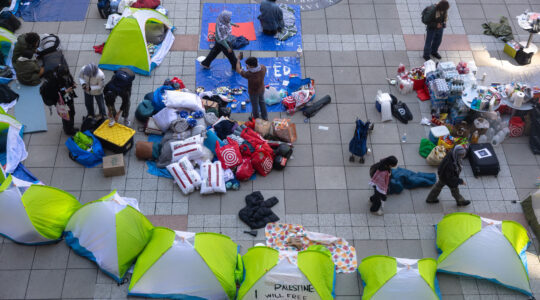While physical relief efforts have been slow in reaching Haiti in the aftermath of the devastating earthquake to hit the beleaguered country, the monetary response to the Haitian has been furious thus far, which will be critical to the long-term relief effort, say humanitarian aid experts.
According to the Chronicle of Philanthropy, U.S. relief organizations have already raised more than $71 million — outpacing what was raised in the early aftermath of Hurricane Katrina and the Asian tsunamis.
The Red Cross, reports the Chronicle, has already raised some $37 million, with the largest single donation to the relief effort coming from George Soros through his Open Society Institute.
The earthquake has elicited an incredible response from the Jewish community, as well. The American Jewish World Service has already raised $1.5 million that it will distribute to the grassroots economic development organizations that it already works with in Haiti. The American Jewish Joint Distribution Committee has brought in nearly $700,000 online through a mailbox it opened for the relief effort and to which dozens of Jewish organizations are directing their constituents.
The JUF-Jewish Federation of Chicago alone has raised some $195,995 from 1,482 contributors for the JDC’s effort, while the Jewish Federation of Toronto has raised $75,000 already.
On the ground, the AJWS says that all of the 10 organizations with which it works are in emergency mode now and have shifted focus to help in the aid effort. For instance one organization that the AJWS funds in the Dominican Republic that is normally focused on helping Haitians in the DR has formed a caravan from the DR to Port Au Prince to bring feminine hygiene supplies and diapers and other items into Haiti that are no longer available.
The JDC, which oversees the Jewish Coalition for Disaster Relief, had a conference call with some 30 Jewish organizations Friday at noon to discuss how they should funnel money into the region.
That the Internet and social media seem to have played a significant role in the outpouring of support is not under debate.
“The Internet is more advanced [than it was in 2005, when a devastating tsunami crushed Southeast Asia]. From having names of NGOs listed immediately on Web sites to the U.S. government, which was completely on top of how to register volunteers and deal with different aspects of the relief effort,” said Will Recant, the JDC’s point person on the Haitian response. “What you are seeing is the new electronic age coming on strongly, and showing how it can support the humanitarian effort. The ability to text $10 has brought a huge response.”
The AJWS, for instance, raised $1.2 million from 11,367 people via its Web site.
It will not be clear for another week or so whether donors have simply shifted the way that they give money, becoming more inclined to give online than they are to send checks, or whether the amount of money given online represents a huge overall outpouring that surpasses the donations that came in the aftermath of the tsunami.
“We have just started opening envelopes here,” the president of the AJWS, Ruth Messinger, told JTA. “So have x percentage of givers switched from postage to the Web? Anyone who tells you they know isn’t telling the truth.”
What is clear, however, is that these handful of days in the immediate aftermath of the earthquake will be the most critical in terms of fund raising, as history has shown that once a disaster leaves the front pages of newspapers and Web sites and becomes a secondary story for the broadcast journalism world, donations drop off significantly.
Some 90 percent of the $19 million that the JDC raised in the aftermath of the tsunami was raised in the first month after the disaster — which the organization then spent over five years in the relief and rebuilding effort.
“When it disappears form public view,” it becomes more difficult to raise money, said Messinger. “This is when most people get alerted to the situation. They want to know who is raising money and who has a plan for what is being raised and what they are doing and who can explain to us what is different and discrete about what we are doing.”





